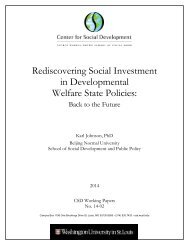Exploring and Assessing Intercultural Competence - Center for ...
Exploring and Assessing Intercultural Competence - Center for ...
Exploring and Assessing Intercultural Competence - Center for ...
Create successful ePaper yourself
Turn your PDF publications into a flip-book with our unique Google optimized e-Paper software.
<strong>Exploring</strong> <strong>and</strong> <strong>Assessing</strong> <strong>Intercultural</strong> <strong>Competence</strong><br />
Figure 2. Contrastive Mean ICC Scores at Beginning <strong>and</strong> End of Service<br />
60<br />
50<br />
40<br />
30<br />
20<br />
10<br />
0<br />
Knowledge Attitude Skill Awareness<br />
ICC Dimensions<br />
<strong>Center</strong> <strong>for</strong> Social Development<br />
Washington University in St. Louis<br />
Beginning of Service<br />
End of Service<br />
Figure 3. Contrastive Mean <strong>Intercultural</strong> Competency Scores at Beginning <strong>and</strong> End of<br />
Service<br />
45<br />
40<br />
35<br />
30<br />
25<br />
20<br />
15<br />
10<br />
5<br />
0<br />
15.85<br />
39.87<br />
Inter Cultural Competency (ICC)<br />
Beginning of Service<br />
End of Service<br />
In the next table, Table 9, we see the results of difference of mean t-test when we compare the<br />
respondents’ assessments of their ICC competency at the beginning <strong>and</strong> end of their service. In<br />
this case, the t-values, significant at p < 0.05 (some even suggest < 0.04), confirm that alumni<br />
clearly improved in overall ICC development <strong>and</strong> in its individual components at the end of their<br />
service experience.<br />
23
















